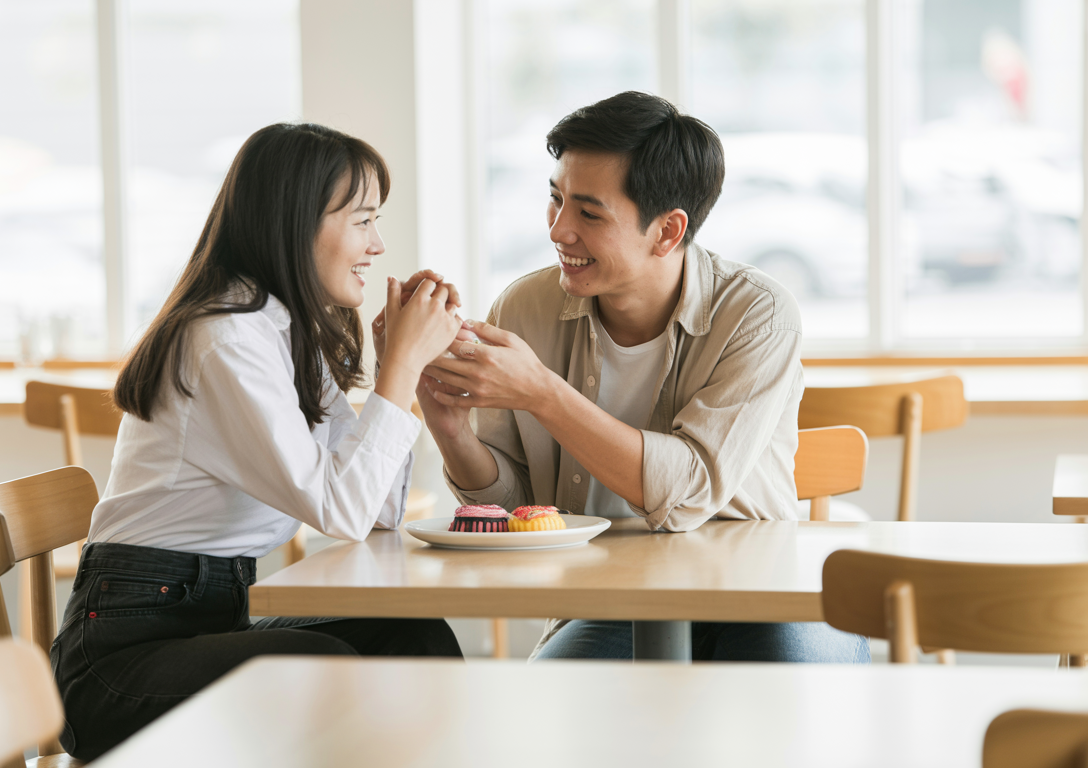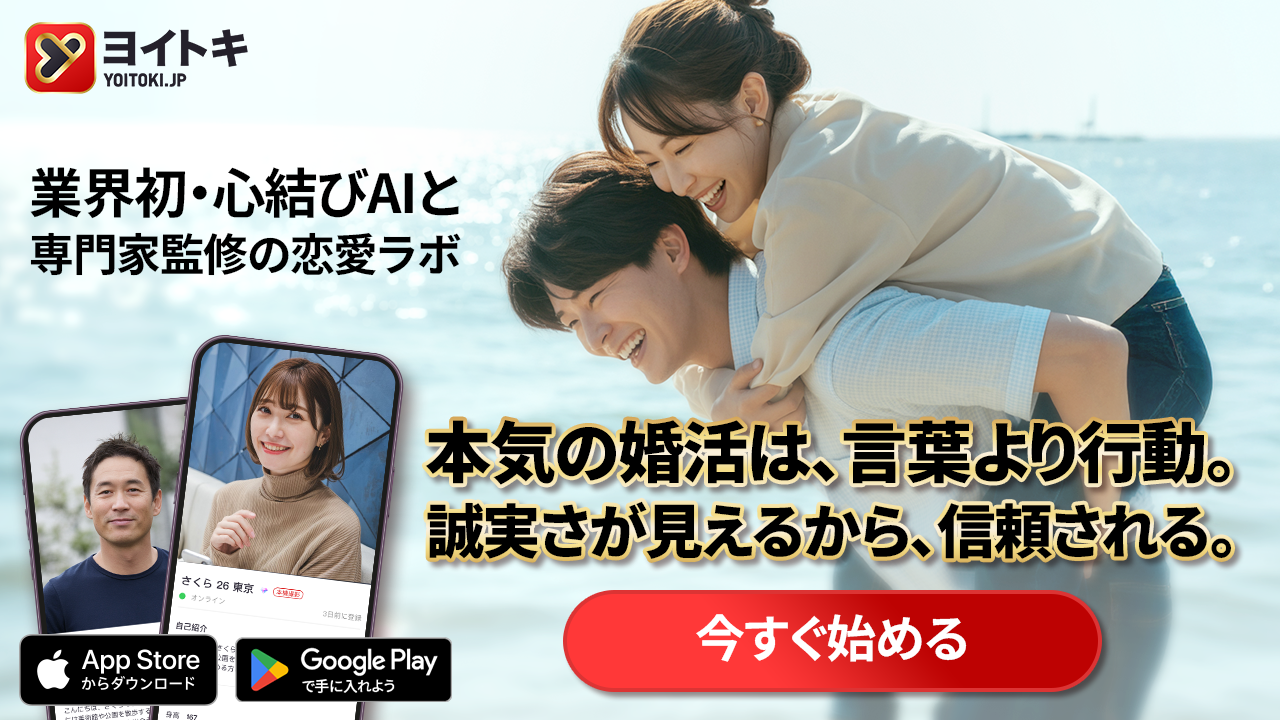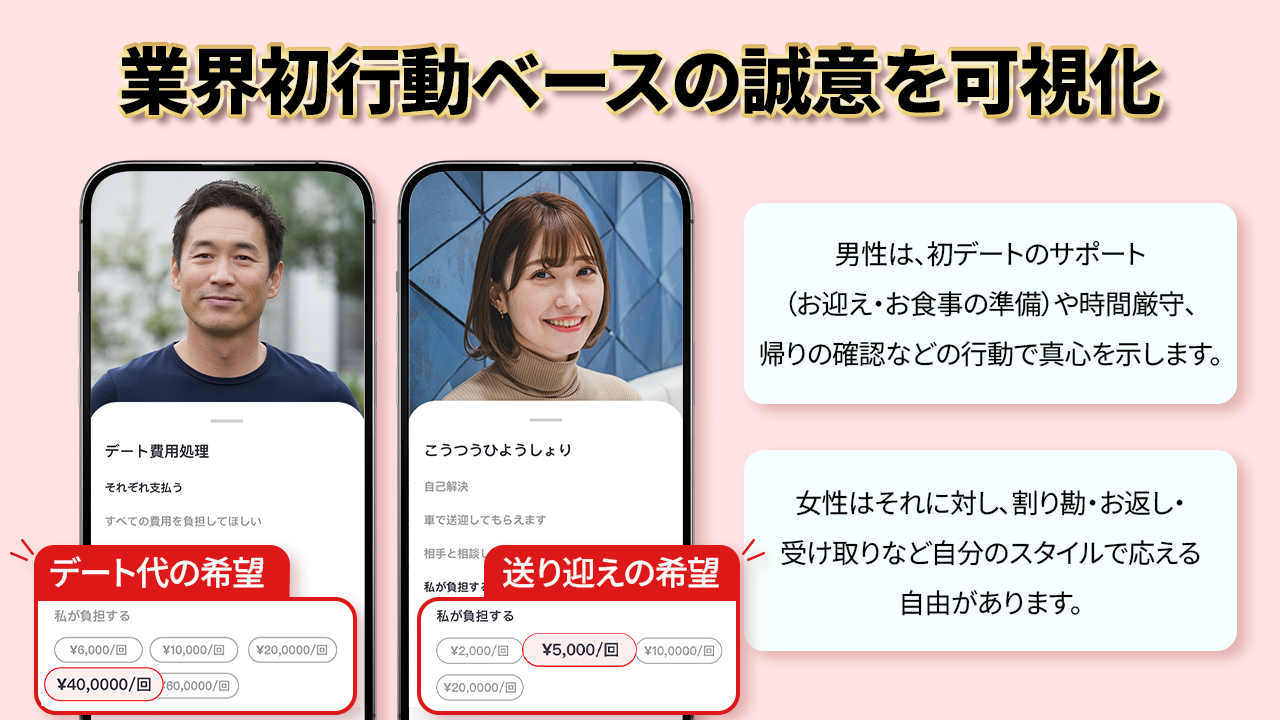「楽しい時間を過ごせるけれど、これって恋愛感情?それとも深い友情?」「あの優しさは、特別な意味があるのだろうか…」。このような「恋人と友達」の狭間で揺れる気持ちは、誠実な関係を求める方ほど、大きな悩みとなることがあります。
多くの出会いの場では、お互いの意図が不明確なまま関係性が進み、誤解や傷つく経験を生んでしまうことも少なくありません。それは、表面的な繋がりではなく、心の深い部分での互いの理解が足りないからかもしれません。この記事では、あなたの気持ちと相手との関係性を、心理学的な側面から丁寧に見つめ直す方法をご提案します。Yoitokiが大切にする「相互尊重」と「意図の明確化」の観点から、「恋人と友達」という複雑な感情の糸を解きほぐし、あなたらしい答えを見つける一助となりましょう。
目次
- 1. 深い信頼か、特別な引力か|友情と恋愛の本質を見極める
- 2. 感情と行動で振り返る|15のチェックポイントで診断するあなたの想い
- 3. 「恋人未満」から前進するには|尊重と思いやりのあるコミュニケーション
- よくある質問(FAQ)
- まとめ:誠実な関係は、明確な意図と相互尊重から
- 新しい形の出会い、始めませんか?
1. 深い信頼か、特別な引力か|友情と恋愛の本質を見極める
「好き」という感情は、実に多面的です。ある人と一起にいるときの安心感は、果たして友達としての「信頼」からくるものなのか、それとも恋人としての「特別な引力」からくるものなのか。この本質を見極めることが、すべての始まりです。
友情の基盤:無償の「心地よさ」と「共感」
友情は、互いの存在そのものに価値を見いだす、安定した絆です。その基盤にあるのは、以下のような要素です。
- 心地よさと安らぎ: 気を遣わずに自然体でいられる、 「ありのままの自分」を受け入れてもらえる感覚があります。会話や時間を共にするだけで、心が満たされ、リラックスできるのが特徴です。
- 相互支援と共感: 互いの成功や幸福を心から願い、困ったときには支え合います。それは条件付きではなく、無償のサポートであることがほとんどです。また、相手の感情や状況に深く共感し、理解しようとする気持ちが働きます。
- 個の尊重と独立性: 良い友人関係では、二人はお互いを尊重する独立した個人です。相手の他の人間関係や時間を自然に尊重し、独占したいという欲求は、通常、前面には出てきません。
友情は、人生を豊かにするかけがえのない宝物です。然而、この関係性は多くの場合、将来二人で「共通の人生を築いていこう」というビジョンまでは包含しません。
恋愛感情の核心:「特別感」と「将来性」への願い
一方、恋愛感情には、友情とは異なる独特の心理的・身体的シグナルが伴います。
- 特別感と固有性: 相手が「他の誰とも違う」という感覚があります。同じことをしても、その人とするからこそ特別に感じられ、強く心が動かされます。これは、Yoitokiが提唱する「深い適合性(ディープ・コンパチビリティ)」の萌芽といえるでしょう。
- 強い好奇心と没頭: 相手のことをもっと深く知りたいという強い欲求が湧きます。趣味や経歴といった表面的なことだけでなく、価値観、夢、恐れなど、内面の核心に触れたいと思うのです。
- 将来への自然な想像: 良い意味で、相手との未来をありありと想像してしまいます。「来月、一緒にあのイベントに行きたいな」「数年後、この人とどんなことを話しているだろう」など、自然と頭に浮かぶのが恋愛の特徴です。
- 身体的引力と距離感の変化: ほんのささいなボディタッチ(例えば、肩が触れた、手を貸した)でも、ときに緊張やときめきを感じることがあります。二人きりの空間が、特別で独特な空気に包まれる感覚があります。
この「友情」と「恋愛」の区分けは、私たちYoitokiの「Kokoromusubi AI」の根本理念そのものです。恋愛は単なる親密さや楽しさの積み重ねではなく、人生の設計図や根底にある価値観の深い部分での一致が持続可能な関係への鍵となります。表面的な魅力や一時的な感情だけでなく、こうした本質的な部分で相手を「特別」だと思えるかどうかが、重要な見極めポイントなのです。
2. 感情と行動で振り返る|15のチェックポイントで診断するあなたの想い
頭で考えるだけでなく、ご自身の素直な感情と無意識の行動を振り返ることが、気持ちを見極める最も確かな方法です。以下のチェックリストで、心と体が発するシグナルに耳を傾けてみましょう。
感情のシグナル:あなたの心はどう反応する?
- 会えない日も、頻繁に連絡をとりたくなるか? (友達なら「時々思い出す」程度、恋愛感情なら「報告したい・共有したい」が自然と湧く)
- 相手が他の異性と親しくしているのを見て、寂しさや嫉妬のような感情を感じるか? (友人なら「良かったね」と純粋に思える)
- 相手のSNSの投稿や「いいね」が、やけに気になってしまうか?
- 相手から連絡が来ると、一瞬で表情が緩み、嬉しさが込み上げてくるか?
- 自分の成功や嬉しいニュースを、真っ先に知らせたい相手の一人か?
行動パターン:自然と相手に向けてしまうエネルギー
- 自ら進んで「次いつ会える?」「会いたい」とオファーするか? (待つだけでなく、能動的になっているか)
- 相手のためだけの時間や労力を惜しみなく割けるか? (例えば、忙しい中でも会う時間を作る、好きなものを用意するなど「尽くす」行為)
- 会う前の身だしなみや準備に、普段より少しだけ力を入れてしまうか?
- ささいなことでいいので、さりげなく気遣いや贈り物をするか? (「これ見て思いついて」という自然なサプライズ)
- 友人とのグループ遊びよりも、二人きりで過ごす時間を無意識に選好していないか?
身体感覚と距離感:理性ではコントロールできない反応
- 自然なボディタッチ(肩、腕、背中など)に、心地よさやときめきを感じるか? または、逆に「友達だから」と少し距離を置いてしまうか?
- 二人だけの空間に、独特の緊張感や、言葉にならない安らぎを感じるか?
- 相手の声のトーンや笑顔、仕草が、なぜか強く印象に残るか?
- 目が合った時、つい逸らしてしまったり、またはしっかりと見つめ返せたりするか?
- 相手のことを考えていると、自然と笑みがこぼれることがあるか?
💡 Yoitoki ヨイトキ インサイト:アルゴリズムを超えて
あなたが直面している課題こそ、私たちが「心結び(Kokoromusubi)」を開発した理由です。 他のアプリが表面的な特徴でマッチングするのに対し、私たちのAIは、ストレスへの向き合い方、思いやりの示し方、価値観の共有といった“深い相性”を見抜きます。
ここで最も重要なYoitokiの角度は、「相互努力」の観点です。この診断は、あくまでも「あなたが感じていること」です。真剣で健全な関係は、片方だけが一方的にエネルギーを注ぐものでは成り立ちません。あなたが感じるこれらのサインが、相手からも同様に向けられているかどうか。この「相互性」が、単なる片思いではなく、発展可能な関係であるかの最大の指標となります。一方的な期待や思い込みではなく、相手の行動や言葉からも、同じようなサインがないか、客観적으로観察してみましょう。
3. 「恋人未満」から前進するには|尊重と思いやりのあるコミュニケーション
自分自身の気持ちがある程度明確になり、相手にも一定の好感があると感じたら、次のステップ是誠実なコミュニケーションです。ここで鍵となるのは、Yoitokiが最も重視する「情緒的な平等」と「相互尊重」です。
自己理解を第一に:自分の気持ちを受け止める
相手に伝える前に、まずは自分自身の気持ちをしっかりと受け止め、言語化することから始めましょう。上のチェックリストの結果を踏まえて、 「わたしは、Aさんを友人以上に好きだ。彼/彼女との将来を考えてしまうほど、特別な気持ちがある」 と、自分の中で宣言するのです。これにより、不安定な気持ちが整理され、次の行動に自信を持って移ることができます。
誠実な対話への準備:「I(アイ)メッセージ」で伝える
気持ちを伝える際、最も避けなければならないのは、相手を責めたり、プレッシャーを与えたりする話し方です。例えば、「あなたがいつもあんなに優しくするから、誤解しちゃうよ」はNGです。
代わりに用いたいのが、「I(アイ)メッセージ」です。主語を「私」にし、自分の気持ちや考えとして伝える方法です。
- NG例 (Youメッセージ): 「あなたのあの行動は、どういう意味なの?」
- GOOD例 (Iメッセージ): 「私は、Aさんとお話ししていると、とても幸せな気分になります。そして、もっとあなたのことを知りたいし、大切にしたいという気持ちが自然と湧いてくるんです。」
この伝え方なら、あなたの誠実な気持ちを伝えながらも、相手の領域を侵すことなく、選択肢を提示することができます。これは、相手への深いリスペクトそのものです。
すべての答えを受け入れる心構え:尊重が生む新たな関係性
もう一つ、覚悟しておくべきことがあります。それは、あなたの気持ちを受け入れてもらえるとは限らないということです。相手の気持ちがあなたと異なる場合、その選択を尊重することが、「情緒的な平等」の実践です。
たとえ「友人としてのままがいい」という答えだったとしても、それは決して失敗ではありません。むしろ、お互いの意図が明確になり、これまでの曖昧さから解放される、一つの着地点です。その場合、一度距离を置き、あなた自身の心を整理する時間を大切にしてください。無理に以前と同じ距離感を保とうとすると、傷が深くなるだけです。
ここで、Yoitokiのプラットフォームがなぜ「感情的な安全性」を担保できるのか、その理由に触れましょう。Yoitokiでは、出会いの最初の段階で、各人が「友人募集」か「恋愛・結婚を前提とした交際」かをプロフィールで明示します。この「意図の明確化」が最初にあるため、このような「恋人と友達」の狭間で生まれるすれ違いや摩擦そのものを、大きなりスクなく軽減できる設計になっているのです。お互いが最初から同じ方向を向いている環境こそが、誠実な関係の第一歩だと私たちは信じています。
よくある質問(FAQ)
Q: 異性同士に純粋な友情は本当にあり得るのでしょうか?
A: はい、もちろん可能です。しかし、それを成立させるためには、お互いの関係性の境界線と、そこに「恋愛感情を含まない」という意図が、最初から双方で明確に共有されていることが大前提となります。Yoitokiのように、出会いの意図を最初に表明する場では、このような純粋な友情を育む土壌も自然と生まれます。
Q: 片思いだと気づいた時、どう行動するのがベストですか?
A: ご自身の誠実な気持ちを伝えることは、自分自身に噓をつかないという意味で、とても尊い行為です。ただし、前述の「Iメッセージ」を用い、相手の反応や選択を尊重する姿勢が何よりも重要です。答えが「友情」であった場合、それは決断であり、その決断を尊重することが大人の対応です。その後は一度距離を置き、ご自身の心を整理する時間を優先させましょう。
Q: 「友達のまま」が良いと言われた後も、関係を続けるコツは?
A: しばらくの間、意識的に距離を置くことが不可欠です。これは「縁を切る」ということではなく、お互いが本来の「友人」としての立場を再認識し、新しい距離感を見つけるための“冷却期間”です。無理に以前と同じノリや距離感を維持しようとすると、傷口を広げるだけです。時間が経てば、新たなバランスで関係を再構築できる可能性もあります。
Q: 価値観の近い相手と出会うには、どうしたら良いでしょうか?
A: 趣味や職業などの表面的な項目ではなく、人生観や恋愛観、家庭に対する考え方といった本質的な価値観に焦点を当てた出会いの場を選ぶことが近道です。Yoitokiの「Kokoromusubi AI」は、アルゴリズムによってまさにこれらの深い価値観の一致(ディープ・コンパチビリティ)を探し、あなたの求める関係性に合った相手をご紹介するように設計されています。
Q: 忙しい社会人ですが、真剣な関係を築く時間はありますか?
A: 真剣な关系とは、一緒に過ごす時間の「量」ではなく、その「質」が何よりも重要です。最初からお互いの意図が明確で、深い適合性がある相手となら、限られた時間でも、濃密で意味のある会話と、互いを尊重する質の高い時間を共有できます。Yoitokiは、お互いの貴重な時間を最大限に尊重し、効率的かつ深く心で繋がれる環境を提供します。
まとめ:誠実な関係は、明確な意図と相互尊重から
「恋人と友達」という問いに向き合うことは、自分自身の心と誠実に向き合う作業です。そして、その答えを出すプロセスそのものが、あなたの関係性の質を決定づけます。
本当に健全で持続可能なパートナーシップは、お互いの意図が尊敬を持って一致し、情緒的に平等な土台の上にのみ築かれます。それは、猜疑心や不安ではなく、安心感と相互成長に満ちた关系です。曖昧なまま進む関係は、往々にして大きなすれ違いと心の傷を生み出します。
この記事でご紹介した見極めのポイントや、尊重と思いやりに満ちたコミュニケーションの心得が、あなたが納得のいく選択をし、ぜひその一歩を踏み出すための力となれば幸いです。
新しい形の出会い、始めませんか?
曖昧な関係に疲れてしまったあなたへ。 お互いの努力と本当の理解の上に築かれたつながりを求めるなら、あなたの居場所がここにあります。







